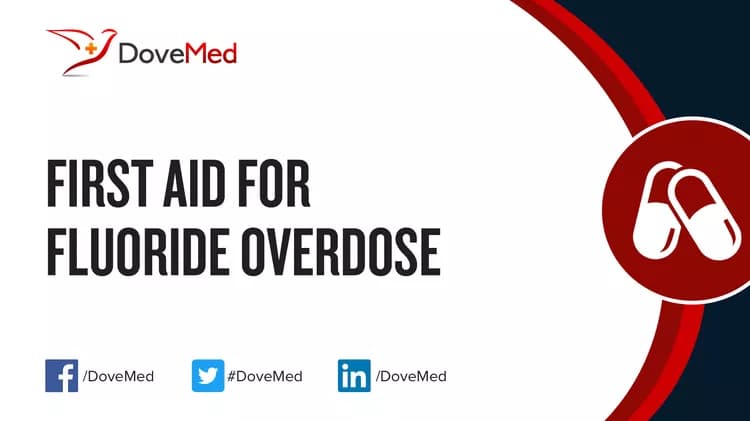What is Fluoride Overdose?
- Fluoride is a mineral that is used in the prevention of tooth decay. It is commonly found in dental care products such as toothpastes and mouthwashes
- The chemical can also form part of certain medications (vitamins), etching compounds/creams, and insecticides. Drinking water may also contain certain added fluorides, in some areas
- Fluoride Overdose is the accidental or intentional intake of the mineral/drug in dosage higher than the prescribed values
- The condition is diagnosed based upon the clinical history, combination of signs and symptoms, and additional tests (that may include, in some cases, radiological studies and laboratory tests)
What are the Causes of Fluoride Overdose?
- Fluoride Overdose is caused by the intake of fluoride from water, mouthwash, toothpaste, vitamin supplements, or drugs in doses above the recommendations
- Children are at a higher risk for Fluoride Overdose and large exposures are dangerous
- This intake could be accidental, or in some cases intentional, to bring self-harm
- According to reports, severe cases requiring intensive treatments are often noted from ingestion of the rust remover (a household product), which contains the chemical hydrofluoric acid
Note: The drug can interact with other prescribed or non-prescribed medications in the body. Such interactions may enhance the therapeutic effects of the drug or other medications being taken, resulting in undesired side effects (such as an overdose).
What are the Signs and Symptoms of Fluoride Overdose?
The signs and symptoms of Fluoride Overdose may include:
- Headaches
- Abdominal distress
- Diarrhea
- Nausea and vomiting
- Fatigue and weakness
- Soapy taste in the mouth; drooling
- Abdominal pain
- Reduced heart rate
- Tremors and convulsions
- Breathing difficulties
How is First Aid administered for Fluoride Overdose?
First Aid tips for Fluoride Overdose:
- If the overdosed individual is experiencing life-threatening symptoms, call 911 (or your local emergency number) immediately
- Call the poison control center at 1-800-222-1222 (or the local poison control center) and follow instructions
- Determine the amount and type of medication taken, time of consumption, patient’s age, weight, and general health status
- Confirm that the airways are protected; also, ensure breathing and the presence of pulse
- If eye exposure has occurred, then wash the eye thoroughly with copious amounts of water (for about 15 minutes)
- Stay with the affected individual until medical help arrives
- Avoid any home remedies, which may only worsen the condition
- Take the individual to emergency room for further treatment
- Always try to take the medication strip/bottle/container to the ER
The emergency medical health professional might take the following steps towards treating Fluoride Overdose:
- Conduct blood and urine tests, obtain an electrocardiogram (ECG), and undertake imaging scans, as needed
- Gastric lavage for elimination of drug from the stomach
- Medically manage symptoms, such as abnormal heart rate and seizures
- Provide breathing support (intubation or ventilator support), if necessary
- Administration of calcium or milk to neutralize the effects of the consumed fluoride product
- Administer laxatives for elimination of drug from the body
- Administer fluids by an intravenous drip line
- Wash eyes repeatedly and thoroughly (irrigation), to eliminate any remaining compound
Who should administer First Aid for Fluoride Overdose?
First aid for Fluoride Overdose is administered by healthcare professionals.
- The individual who overdosed, or someone near, should call 911 for emergency assistance (or the local emergency number)
- They should also call the Poison Control Center at 1-800-222-1222 (or the local poison control center) and follow instructions
What is the Prognosis of Fluoride Overdose?
- Typically, fluoride intake in harmful dosage is unlikely, and hence, the prognosis of Fluoride Overdose is usually good
- However, severe cases of overdose can result in a cardiac arrest
In general, overdoses are common situations in the emergency departments. A majority of the cases are often not fatal when appropriate treatment is given.
How can Fluoride Overdose be Prevented?
Fluoride Overdose can be prevented by:
- Drinking bottled water if town/local water supply contains fluoride compounds
- Exercise caution, in order to prevent swallowing of an excess amount of toothpaste or mouthwash
- Parents should monitor the amount of toothpaste and mouthwash young children use for oral care
- Keep dental hygiene products that have prescription doses of fluoride out of reach of children
- Monitor usage of such dental products in children
It is important to give your healthcare provider a complete list of prescription and non-prescription medications that are being currently taken. This will help them in assessing the possible drug interactions within various medications and help avoid/prevent accidental or unintentional toxic drug effects.
What are certain Crucial Steps to be followed?
- Call 911 (or your local emergency number) for emergency assistance, if symptoms are life-threatening
- Call Poison Control Center at 1-800-222-1222 (or the local poison control center) and follow the recommend steps
- It would be helpful if the following information is readily available:
- Type, dosage and time of administration of medication
- Age and weight of the individual
- And, the overall health status of the individual
Related Articles
Test Your Knowledge
Asked by users
Related Centers
Related Specialties
Related Physicians
Related Procedures
Related Resources
Join DoveHubs
and connect with fellow professionals


0 Comments
Please log in to post a comment.